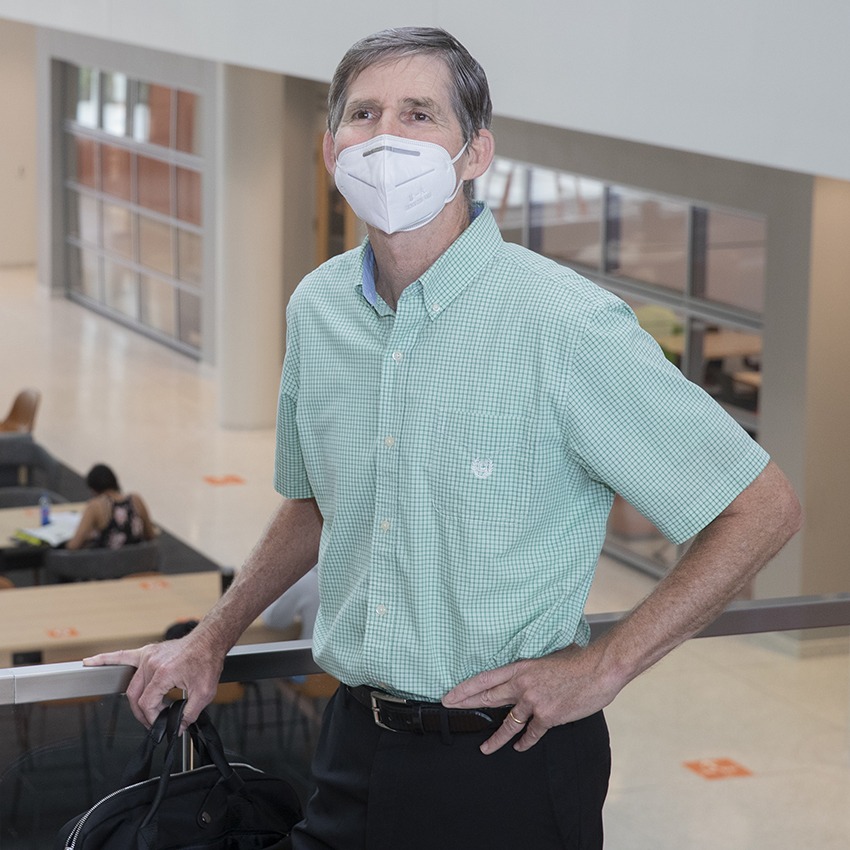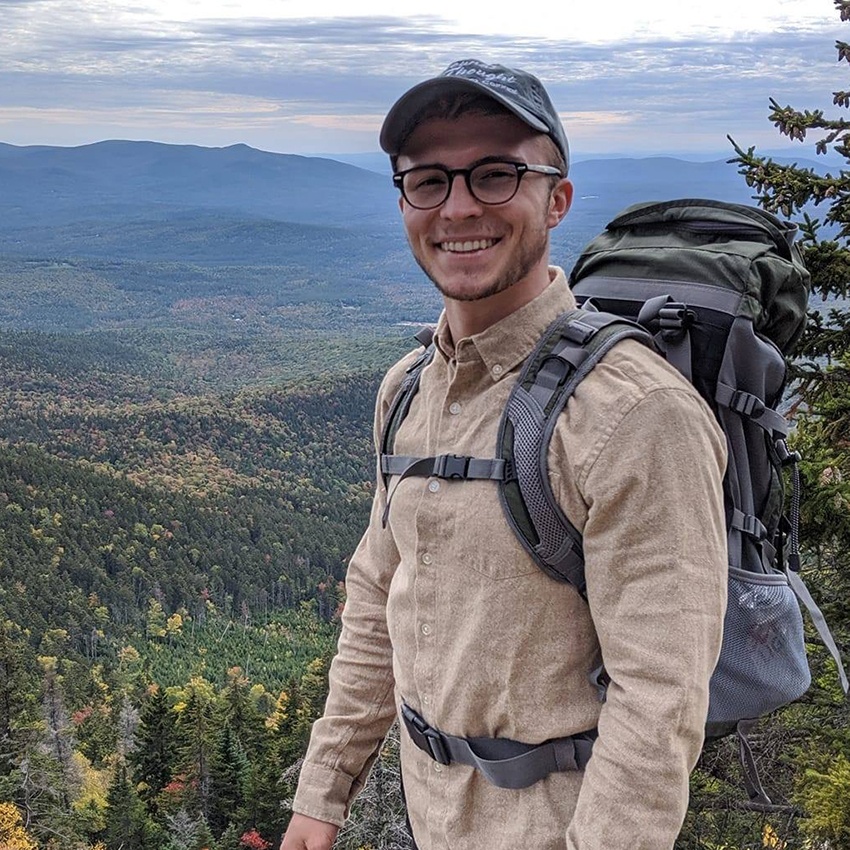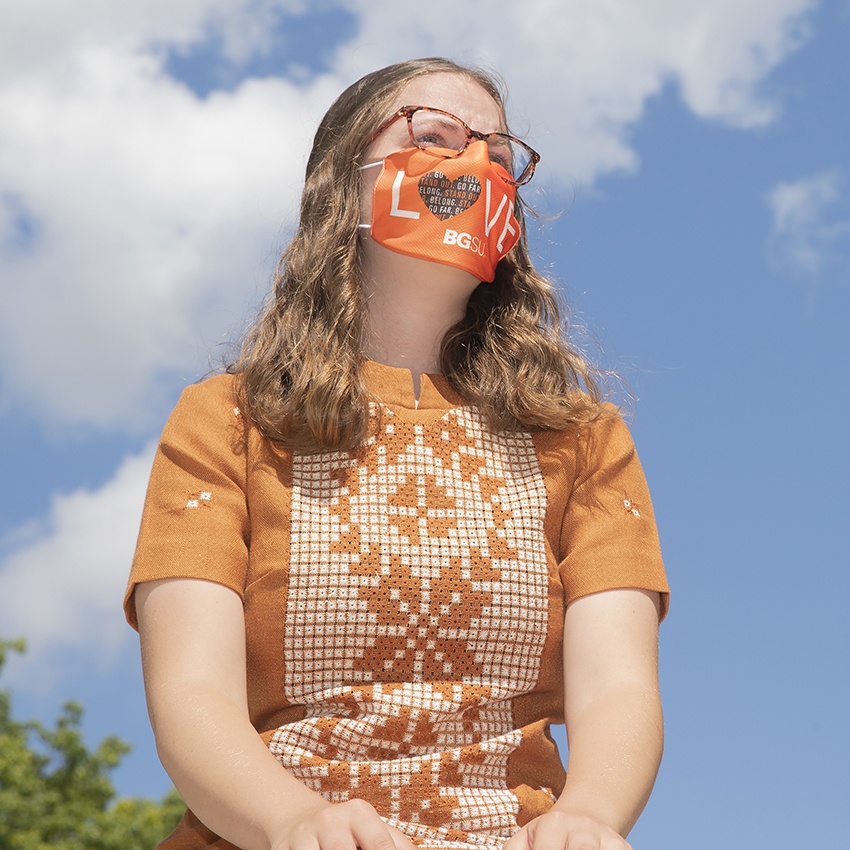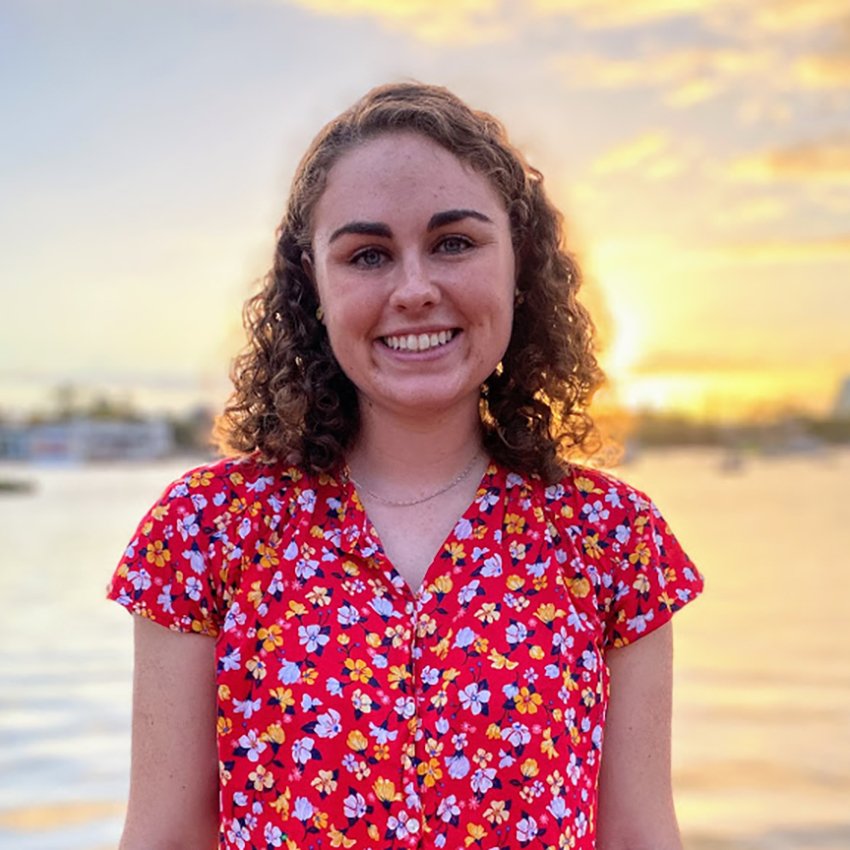Fulbright Fellows await opportunity to fulfill purpose
Pandemic interferes with traditional 10-month Fulbright teaching schedule
By Julie Carle
Dr. Earl McKinney, a Bowling Green State University management information systems professor, is ready to teach and advance his research in the ambiguity of analytics in Austria.
BGSU alumni Codey Albers ‘17 and Alexa York ’20 are set to teach English in German schools. And Savannah Campbell, who graduated in 2019, hopes to teach English in Costa Rica.
McKinney, Albers and York have received Fulbright grants to teach, and Campbell is a Fulbright Teaching Assistant (ETA) alternate. As of now, the students' plans are thwarted until at least January because of the COVID-19 pandemic. McKinney's work will begin in February.
This group is one of the largest BGSU contingents in a single year. According to Michelle Ploeger, coordinator of Education Abroad in BGSU’s International Programs and Partnerships, the Fulbright U.S. Student Program is designed to increase mutual understanding between the people of the United States and other countries.
Recipients are selected based on academic or professional achievement, as well as demonstrated leadership potential in their fields. Students and recent alumni interested in participating in next year's Fulbright program have until Sept. 14, 2020, to apply through BGSU.
As this year’s recipients await final decisions whether their Fulbright assignments will happen, here are their stories:

Earl McKinney
Dr. Earl McKinney’ believes a teaching philosophy should have results and that he should have results in his own life that demonstrate his own self-learning and passion. Those beliefs fueled his decision to apply for a Fulbright Scholar grant to teach and do research in Austria.
If the assignment proceeds for this year, McKinney will teach two graduate-level courses at Salzburg University of Applied Sciences as a Visiting Professor next spring. He will also be working on a research project titled “Analytics in Ambiguity: Finding an Answer When the Answer is Expected.”
Along his personal scholarship path, he has learned new analytic software and techniques to teach his students, and he has embarked on learning Chinese, demonstrating his passion to continue learning and his willingness “to be awful in the process,” he said, adding that his “faltering Chinese language skills also help me to be a better ambassador who is sensitive to cultural differences and challenges.”
He has taught in the United States and China, but he wanted to expand his experiences. He thought interacting with students and faculty in a European educational culture would be beneficial. Adding this third culture will allow him to test and improve the survey and case studies of his research topic with a very different group.
His teaching and research are in the area of analytics, and currently with a focus on being informed with analytics in ambiguity. With new data flooding the world on a daily basis, “we are drowning in data,” he said. “Analytics helps us make sense of all this data.”
“In many analytics settings, there is clearly a best answer, one best interpretation of the data,” he said. “However, many problems do not have a single best answer.”
This ambiguity, that offers multiple interpretations of data” is at the heart of McKinney’s research.
“I plan to evaluate awareness of ambiguity, suggest methods for applying analytics in ambiguity and provide cases where the applications can be taught. Learning to address ambiguity provides great opportunities for students, including building curiosity, taking responsibility for their own learning and keeping an open mind.
He plans to share his research to “help professors in many different cultures better understand their students’ outlook on ambiguity,” he said. “It will also provide some examples of cases teachers can use in the classroom to help students understand how to analyze data without right answers,” he added.

Codey Albers
Codey Albers ’17 hoped to travel to Germany this fall to fulfill his goal of being a Fulbright Teaching English Assistant (ETA). It was a goal he set while studying communication and German at BGSU.
He grew up in Silver Lake, Kansas, speaking German with relatives who live in Frankfurt and Stuttgart. During his time at BGSU, he improved his language skills in classes on campus and during the two semesters he studied in the Academic Year Abroad program in Salzburg.
He first learned about the Fulbright grant program from some of the German faculty. They encouraged students to consider the grant opportunities available through the Fulbright program, promoting it as a way to expand international engagement and partnerships.
After graduating from BGSU, he taught middle school students and developed apps and websites in Boston. When his initial teaching contract was up, he was ready to take “the next logical step” in his career. The Fulbright program offered him the chance to return to the country he loved and to continue to help students accomplish their personal learning goals.
Though he does not have his exact placement in Germany yet, he will be close to Stuttgart, and most likely placed in a school where students have predominantly immigrant or minority backgrounds. As a Fulbright ETA within the Diversity Program, he will focus on helping the students of immigrant families transition to German life.
“Germany is still impacted from the 2016 Syrian Refugee Crisis,” he said. “There's still quite a bit of animosity for immigrants in many areas. The goal, as a cultural ambassador for the U.S., is to help ease tensions and bring communities together.”
He is disappointed that the global pandemic is cutting short the time he will serve as a teaching assistant. The award was scheduled to begin in September or October, he said, but has currently been delayed until at least January. The timeline is still uncertain, Albers said.

Alexa York
With a brand-new diploma in hand, Alexa York ’20 was ready to take her music education and German experiences and knowledge to Germany for 10 months as a Fulbright Teaching English Assistant. COVID-19 cut into that plan and shortened it by at least four months, maybe more. But the Luckey, Ohio, native is staying hopeful that she will be able to travel in January to Saxony-Anhalt, a smaller state located in what used to be East Germany, to begin her Fulbright assignment.
When applying for the program, through the encouragement of her German advisor Dr. Kristie Foëll, York knew she wanted to be in Germany. “I think each region in Germany has its own special charm and history,” she said. “Keeping an open mind on my location placement left virtually no room for disappointment.”
She knows the region of Germany where she will be, but does not know the school yet. Wherever she is placed, she will be teaching lessons, assisting with translations and offering perspective as an American and native English speaker.
The timing to apply for the Fulbright grant was an ideal post-graduation step for York. Though she was leery that earning a Fulbright was achievable for her, she was determined to use her German skills before she began teaching music.
Participating in BGSU's intensive three-week German course in the Salzburg summer program in 2018 and her experience teaching all ages as a music education major seemed to give her the leg up on the application, she said.
“The opportunity to combine different aspects of my major (music education) and minor (German) by teaching English in a German school seemed absolutely perfect for me,” York said. “Plus, I love to travel, and getting some international teaching experience is definitely a bonus!”
Citing Germany’s high education ranking, she expects “to gain a comprehensive understanding of the German education system and pedagogy that I can bring back to my own classroom once I begin my teaching career.”
Once she returns from the Fulbright assignment, she plans to look for a teaching job in the United States, “but as I think we've all discovered this year, future plans can change very quickly and are not always certain!
“Unfortunately, as the pandemic still holds many uncertainties, my trip to Germany is dependent on global travel advisories being reduced.” If the pandemic creates a worst-case scenario and cancels the grants for 2020, she and the other Fulbright winners were told to reapply for next year.

Savannah Campbell
When Savannah Campbell ’19 was in seventh grade, she took her first Spanish class and instantly knew she wanted to become fluent in the language and understanding the culture.
In high school, when her Spanish IV teacher talked about being a Fulbright ETA in Mexico, Campbell tucked away the idea that living abroad could be the best way to truly embrace the language and the culture.
As a Spanish major and international business minor at BGSU, the Medina, Ohio, native continued to hear about the Fulbright program through various University experiences. A small-group leader for the Cross-Cultural Conversation Connection spoke being an ETA in Germany; a graduate student she met while studying with BGSU’s Spain in Alcalá de Henares program had been an ETA in Germany, and a fellow undergraduate student in the Spain program was working on her Fulbright application to do research in the Czech Republic.
The final exposure that “really cemented for me my desire to participate in the Fulbright program was when I spoke with Michelle Ploeger from the Office of International Programs and Partnerships,” Campbell said. When Ploeger said Campbell could live and study abroad as a post-graduate, she vowed to apply to participate the year following her Disney College Program internship.
She was determined to further immerse herself in Hispanic culture by applying to teach in Costa Rica. She also wanted to put into practice a lesson she learned while studying in Alcalá de Henares. “I first heard the phrase no pasa nada. Literally translated as ‘nothing happens,’ the words convey a sense of ease; a feeling that time is abundant rather than pinched and that leisure time and relationships should take priority,” she said.
As an alternate candidate for the Costa Rican ETA Fulbright, her status is uncertain even if travel restrictions are lifted from the COVID-19 global pandemic. She awaits the final determination and hopes this opportunity “will be the first of many as I continue to learn and teach about language and culture.
“My passions for learning about and being immersed in Hispanic language and culture along with my desire to one day teach about them are what continues to drive me in all I do.”
Updated: 09/16/2020 04:32PM
